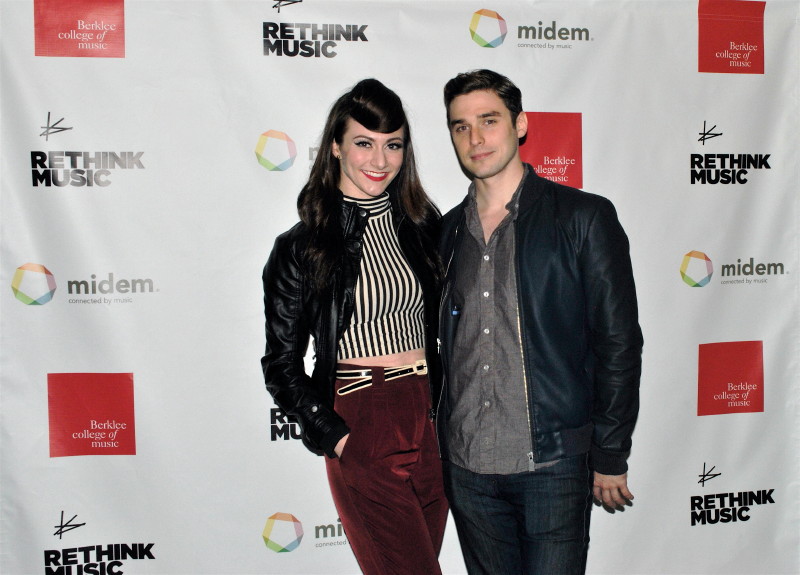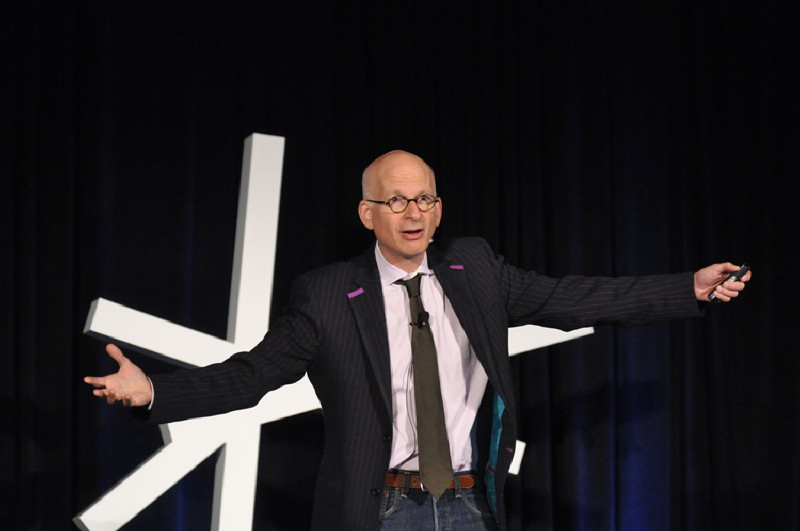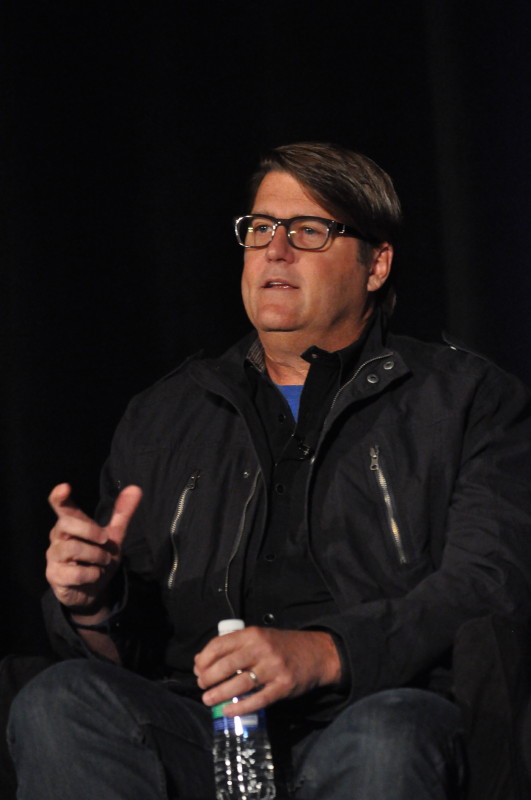
Photo Credit: Farah Joan Fard/LaParadiddle.com
The music that you make as an art form isn't in trouble at all; it's in great shape. It is the music industry and the music business that is in trouble. - Seth Godin
Internet music sensation Karmin floated into the room engulfed with a mod 1950s demeanor, suicide rolled hair, and an on-top-of-the-world aura. It seemed that at any second they might lose their composure and shout out, "we did it, we did it!" And that wouldn't be far from the truth, as they have accumulated upward of 300 million Internet views on their own accord and, subsequently, found themselves fielding nearly every major label groveling to be their partner in crime. They are legitimate stars now and they are one of the many current trendsetters informing the Rethink Music conference held by Berklee College of Music and the Berkman Center for Internet and Society at Harvard University on the chutes and ladders associated with the current music business.
Just a few short months ago, prior to the upheaval of stardom, Amy Heidemann and Nick Noonan of Karmin were figuring out their plan to break into the music industry. Nick was working at a boxing club and Amy was answering phone calls for Berklee College of Music, the same college where they met, and where I am talking to them today. But their life has been significantly altered. Their massive Internet success allowed them to obtain appearances on Saturday Night Live and Ellen, as well as develop a devoted fan base relationship that continues to catapult them into the future. Although the story of Karmin's rise is positive, and inspiring, it perhaps more importantly exemplifies the changing of the musical guard. Karmin built their future holistically, by themselves, one skill set at a time. Amy talks of their defining skills,
We were the most self sufficient band. Anything we wanted to do, we would learn. Instead of paying someone else to do it -- not as well as we would like it to be -- we learned it ourselves: hair tutorials on Youtube, our web design. Everything was DIY.
Not only did Karmin learn the tangible skill sets for a 2012 musical existence, they also quickly uncovered where to plot their musical course to garner a significant fan base. Nick speaks of Karmin's move toward employing cover songs and a strong YouTube grounding by saying,
We were uploading originals first and no one was watching it. So Nils Gums, our manager, said 'you guys should do covers because you have the personality and sound to twist it up and make it unique,' and he started recommending stuff that was on top of the iTunes and Billboard charts. He taught us how to tag the videos so they came up on searches. Thirty some videos later, we had a viral hit.
Roger Brown, President of Berklee College of Music, says that it important to note that, "a lot of people think Karmin just got lucky by doing one video and it went wild. In reality, they already worked hard and diligent to obtain a fan base of hundreds of thousands of people so when they did that video [Look At Me Now] their fans were willing to tell the world about it."
Allen Bargfrede, Executive Director of Rethink Music, believes there is something important in the merging of music and online video and says,
This combination of video and music has become incredibly important. There was the pre-music video days, then video came along and it was really important, then MTV decided they were just going to show reality TV, and so that fell into the background, and now because it is so easy to make a video you need to have some kind of promotional tool in addition to the music. It is about a whole package of building the intersection of video and music. That is going to be a really important thing going forward.

Author Seth Godin also highlighted the use of creativity to gain video viewership, fans, and musical clout. Godin referenced a recent viral video cover sensation which helped define the band Walk Off the Earth as they covered Gotye's "Somebody I Used To Know." Godin asks, "Why can't it be you who gets 96 million YouTube visits because you come up with the idea of having five people play one guitar at the same time?" The crowd was silent to the rhetorical question--because as everyone understands, it is obtainable.
But critiques to this new method of propelling yourself up toward the top of YouTube searches by employing cover songs are beginning to ringing louder. Karmin had to field questions on their artistic merit for their heavy use of cover songs but veteran musician Amanda Palmer, who recently received accolades for her recent cover of Polly by Nirvana, goes to bat for Karmin and told me,
If I am not mistaken, the Beatles did it. If you can transmit a great song and touch somebody, that is fundamentally fantastic. If you can generate a song that you can perform and touch somebody you are more fantastic. That doesn't mean that if you are performing covers you are not bringing something to the table. Music is fundamentally like that. Music started like that. It wasn't about generating new material and impressing everyone every fucking second.
The Music Business Stalls
The ability for bands like Karmin to create, promote, and reap the awards of good artistry prior to a major label contract helps to illuminate just how far and fast the music business game has changed. There are no gatekeepers. Godin emphasizes that the labels are still clinging to a scarcity model of monetizing their collection in a world that has embraced the free flowing abundance of digital commodities. And he further says that this label mentality of slowly wading into the digital world is similar to timid trapeze artists: you can't be timid or you will wind up dead on the floor. Geoff Cottrill, CMO of Converse, follows Godin's sentiments and tells me:
Between the artist, the brand, some of the technology companies, and the labels, there needs to be innovation from all of those places but we have not seen as much innovation coming out of the label system as we need. What is dangerous is there is so much innovation coming from the technology companies these days, the labels could find themselves in a very tough place.

Music trend blogger Bob Lefsetz sent out his Lefsetz Letters "mailbag" to his gazillion subscribers on May 1, 2012. The letter Lefsetz included was from Amanda Palmer specifically prancing to the fact that she feels so free and happy after she broke free from Roadrunner Records in 2009. Palmer wrote to Lefsetz to point out the fact that on April 30 she created a kickstarter.com page for her new album "Amanda Palmer & The Grand Theft Orchestra." In the first day she received $360,000 which is $160,000 more than her scheduled recording budget had she stayed on Roadrunner Records.
Technologically savvy Palmer says to Lefsetz, "They [Roadrunner Records] seriously didn't think the Internet was necessary unless you had a record to push. They didn't understand the value in staying connected all the time, every day, from the road, from the spaces between. They didn't get it at all." She concludes her correspondence with, "Seriously: I can't imagine why I'd do this any other way."
Apparently "her way," is working. Palmer allows the Internet and its tools to connect her fans and their funding directly to her life and her music. And more importantly, she weaves this intricate relationship using the tools of the information society. Twitter is her tool of choice and she connects with her fans, shares with her fans, and occasionally asks for things (like to borrow a fretless bass in Australia) which miraculously was produced in less than 15 minutes. And this is the give and take that induces creativity and loyalty. Since she is so accustomed to the digital connection with her fans, she told me, "I now cannot fucking imagine going on tour without Twitter."
Brands Kick it Up a Notch
Although the music industry may be sluggish, there is a large subsection of the industry staying progressive and forward thinking and that is the brands and advertisers who are creating partnerships with musicians. Over the last several decades there has been a certain stigma associated with artists merging with advertising initiatives, but the brick wall of reluctance seems to be crumbling. Roger Brown speaks to this by saying:
Lets face it, radio was always a tool for advertisers to reach an audience. And musicians had this notion that they shouldn't sell out by doing a commercial. Well they were doing a commercial, they just didn't know it. They licensed their music to a record label who gave it to a radio station that then used it to attract a market. Now the artists have got over that. In a way we have disintermediated the radio, the journalist, the television, and we are just working with the people who want to use our music to promote our product.
Rob Stone, president of Fader Media, is one of the foremost experts of the branding and music relationship and speaks to the opposite side of the brand equation: the consumer. Stone says, "there is a progression of the consumer who is now more accepting of artists working with brands. When it is done right you get something like Converse's Rubber Tracks Studio's Three Artists One Song." The latest Three Artists One Song endeavor found Mark Foster (Foster the People), A-Trak, and Kimbra creating their original song "Warrior" recorded at Rubber Tracks Studio and available for everyone for free download.
Mark Foster commented on the process of working under Converse's wing on the Nike website by saying, "I had such a good time diving into the creative process working with two incredible artists to create a sound that is uniquely our own. This project has given me a new found appreciation for the power of collaboration which is something that Converse really understands."
Rob Stone says there is definitely a growing interest from all sides in partnering with brands. Stone has worked closely with the Green Label Sound project by Mountain Dew and told me, "From year one the bands say I am not doing anything with a carbonated drink, by year two they are coming to us, by year three we are telling artists that we don't have the capacity to put it all out."
The record label executives of previous eras might have been the 'hit makers,' but the popular music trend setters of this era may be more aptly defined as the 'business class.' Regardless, the kingpin of the situation is the musician with a $700 laptop. With laptop in hand, the world of opportunity awaits. But, like anywhere, it comes down to the most important commodity known to mankind: creativity.
photos: Phil Farnsworth